Deep Space 9 has always been rather notoriously divisive among Trekkies. There don’t seem to be very many moderate opinions on it. Either you believe, as I do, that the series’s expansive plots, well-rounded characters, and willingness to explore challenging topics made it a high-point for the franchise, or you think it’s a betrayal of everything Star Trek is supposed to stand for.
And not much in between.
You see, back in the 1960s, a man named Gene Roddenberry had a vision. It was about a future where technology had solved most of our problems, and where human beings had evolved to a point where they were above the things that caused those problems. Like greed, jealousy, prejudice. This was quite remarkable in a world where people were quite literally expecting hydrogen bombs to drop on their heads at any moment, and the vision of the future were often not so optimistic.
Of course, Roddenberry wasn’t always as progressive as he thought he was. Though perhaps none of us will be at the distance of fifty years. Star Trek gave us television’s first interracial kiss, but his non-white characters were often reduced to tokens. (He once told George Takei that his character “represented all of Asia”) and the depiction of women in the original series was sometimes… patronizing. Yes. Let’s be generous.
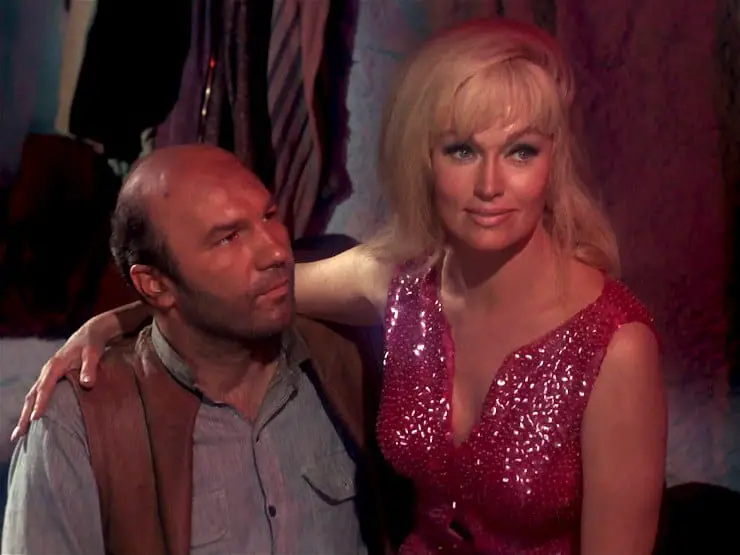
But he had an ideal, even if he was too much a man of his time to live up to it. And this was a future where race and gender just don’t cause conflict between people. And neither do, like, our emotions. You can see how this might cause issues for a writer trying to get out a script for a television show. These people are never jealous, so a lot of romance plots are hard. So are a lot of plots about ambition, or even professional rivalries. Money doesn’t exist, so there goes a lot of the little crises that rule our daily lives. And, perhaps most famously, they don’t grieve, because death is just another part of life.
But you kind of need conflict to tell a story, ya know. So there are three basic ways around it that are classically used in Trek. Each comes with challenges of its own.
Firstly, the conflict in the story could be external, and involve some kind of technology or natural phenomenon. These stories are about the crew of the ship using their knowledge and ingenuity to solve problems. This has lead to some good episodes, “Booby Trap” was a fun hour of television, but it also leads to rather silly “anomaly of the week” episodes that get repetitive very, very fast. If they’re feeling creative it could be a holodeck or transporter malfunction. I would cite an example, but I can literally choose any episode of Voyager.
Secondly, you can have aliens there to be the irrational ones. And the enlightened humans are there to teach them the error of their ways. This is what the Prime Directive is all about, a commitment to not interfere in the affairs of other, nor to judge them, but always seek a way to coexist, and resolve conflicts peacefully.
But as you can imagine, this can get a tad… preachy. Especially when paired with bone-headed decisions, like making all the aliens black, or if the episode has a “message” it delivers with the subtlety of a sledge hammer. The Prime Directive is supposed to be about not assuming your own way is the only right way, but that’s seldom how it turns out. For every “Let That Be Your Last Battlefield” there is a “Code of Honor”.
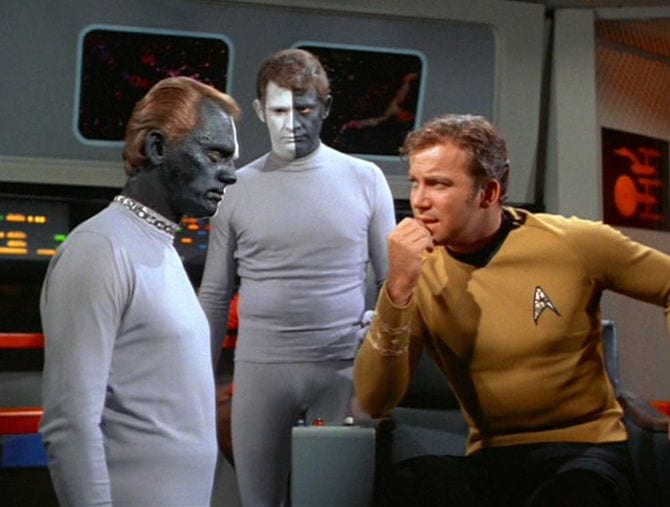
The third way around the box is: mind control. Aliens take over your body, the radiation from the star makes you horney, an omnipotent being gives you a personality transplant. All those things have happened multiple times. “Power Play” was an okay episode.
Like I said, a lot of quality stories have come out of this box. Michael Piller, one of the main writers in the TNG era, has argued that the Roddenberry Box (a phrase he coined) forces writers to be creative, and not fall back on the same old stories. He may be right, and he’s probably a far better writer than I am, but the main issue with the Box for me has always be a rather fundamental one: it forces the series protagonists to be people my jealous, greedy, prejudiced self can’t really relate too. At all.
It’s not like they’re struggling to overcome their flaws, I love watching that, it’s that they often don’t have them. So they often come across as humourless, and unempathetic, wet blankets. Very few people watched Star Trek: The Next Generation because the human characters were compelling. Sure, Captain Picard was awesome, but in the first couple of seasons at least, I often wanted to punch him in the face for being a heartless, curmudgeonly robot. Therefore it’s not surprising that my favourite entries in the franchise are often (but not always) those that break this rule.
Did you know that Roddenberry hated The Wrath of Khan because Star Fleet was too militarized? Well, I liked that movie. A lot.
Then there was Star Trek: Deep Space 9, which is my favourite because all it did was break the rules.
This series was a challenge to the Box from its very conceptualization. Where all the other series were about a starship that traveled from place to place, running into new and self-contained situations each week, DS9 took place on a space station. Problems came to them, and they didn’t always disappear behind them at the end of the week.
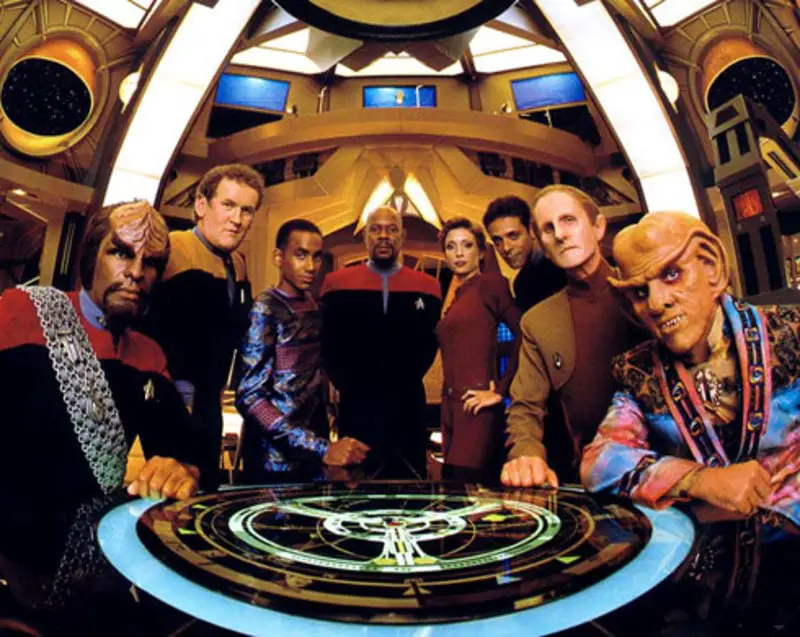
This starts in the pilot episode when we meet our series lead; Commander Benjamin Sisko. He didn’t get the memo about how humans have gotten over the need to grieve, because he is still not at all over the death of his wife three years before. He comes to Deep Space 9 and is thrust into a complex political situation that he doesn’t understand, all while trying to raise his son on his own.
The main plot of the pilot deals with him coming to the realization that he has not moved on. Possibly because he lives in a culture that says grief is unenlightened. Possibly.
The station, unlike the utopian United Federation of Planets where most humans live, is on the frontier. It’s a place where all the problems that humans (and other humanoid species that are, let’s be honest, often indistinguishable from human except that the actors playing them have to stay in make-up longer) have overcome still exist. And the people there aren’t necessarily convinced that we have all the answers.
The nearest planet to the station is Bajor, a place that has just come out of a brutal, sixty-year military occupation by the Cardassians.
These two cultures receive a lot of development over the course of the series. They’re both rather sharp foils to the Federation.

The Bajorans are an old, self-confident culture that have been in decline for the past few hundreds years. The Occupation left many millions dead, and a good many more traumatized. They’re also a deeply religious culture, something that was anathema to Gene Roddenberry, and something that many Federation characters have trouble understanding. For a very long time, they didn’t intervene with the Occupation, despite the fact that many knew how bad it was, because of the Prime Directive.
Understandably, it takes many Bajoran characters a while to forgive them for this, and to process all those years of pain and hatred. This was not always something that was handled very elegantly. There were perhaps one or two too many episodes where Kira discovered that not all Cardassians are evil, but maybe that was to a point. Maybe it’s not so easy to put aside your prejudice when you’ve actually suffered.
The Cardassians are a comparatively young culture. They’ve had a hard time too in the last few hundred years, and they’ve become a totalitarian military dictatorship, obsessed with expansionism and conformity. They didn’t understand the Bajorans either. They wouldn’t have had to oppress them so much if they’d just layed down and took it, you know?
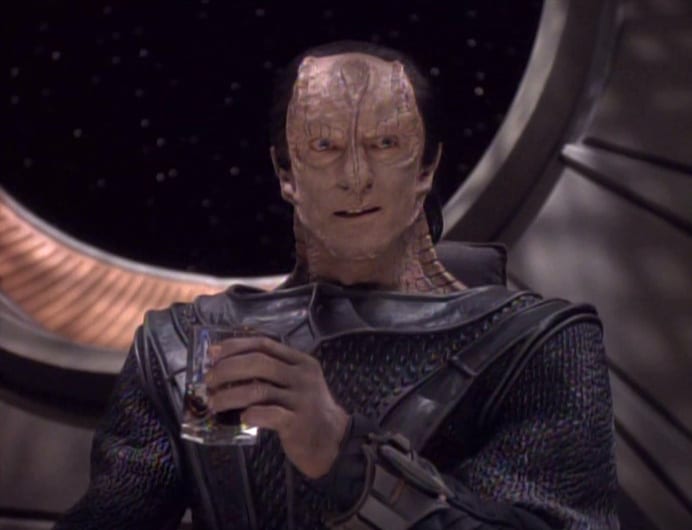
The main character who best exemplifies how contact with these cultures challenges the human characters is Doctor Julian Bashir, played by man-who-deserves-better Alexander Siddig. When we first meet him in the pilot, he is insufferable. A newly minted doctor and officer who takes the first opportunity to go all white-savior (I know he’s not white… but it terms of analogy in this SF setting, he may as well be) talking about how he’s super excited to have an adventure out here in the wilderness.
Unfortunately for him, he said this to a former child-soldier who grew up associating doctors with horrifically unethical medical experiments.
BASHIR: This is where the adventure is. This is where heroes are made. Right here. In the wilderness.
KIRA: This wilderness is my home.
BASHIR: I didn’t mean…
KIRA: The Cardassians left behind a lot of injured people, Doctor… you can make yourself useful by bringing some of your Federation Medicine to the “natives”… you’ll find them a friendly, simple folk…
Bashir is also challenged in his Federation ultra-liberal ideals by his relationship with Garek, the station’s token Cardassian. Their discussions about literature and whatnot are often funny, and really hit home the fact that there is some values dissonance that can’t be overcome.
BASHIR: But the characters never really come alive. I mean, there’s more to life than serving the state.
GARAK: A Federation viewpoint if ever I heard one.
But my favourite Box challenging moment for him comes in a rarely discussed little episode called “The Quickening”. In it, Bashir and a few other characters travel to a planet in the middle of a plague. He, of course, promises that all his wonderful technology and progress can give them a cure. But he fails.
BASHIR: They believed in me. Look what it got them. Trevean was right… there is no cure… the Dominion made sure of that. But I was so arrogant, I thought I could find one in a week…
DAX: Maybe it was arrogant to think that. But it’s even more arrogant to think there isn’t a cure just because you couldn’t find it.
And though the episode ended with a partial victory (infant vaccines save lives!), he never does find a cure. There are off-hand mentions of him continuing to do research even seasons later.
Doctor Bashir takes a few seasons, but he eventually becomes one of my favourite characters in the series. His naive idealism turns into a strong moral conviction tempered by pragmatism. And he gets over his adolescent skirt-chasing phase, which the women of the station were as grateful for as I was. (Too bad he developed a case of the not!gays, but that’s a different piece.)
And speaking of that “Dominion” he mentioned…
Many will argue, with justice, that the deuptopiafication of the Federation started with the Borg invasion on Star Trek: The Next Generation, but it was really this show, and the 5-season-long Dominion War arc, that explore the full implication of what might happen when a society that reject violence finds itself having to fight a necessary, and just, war.
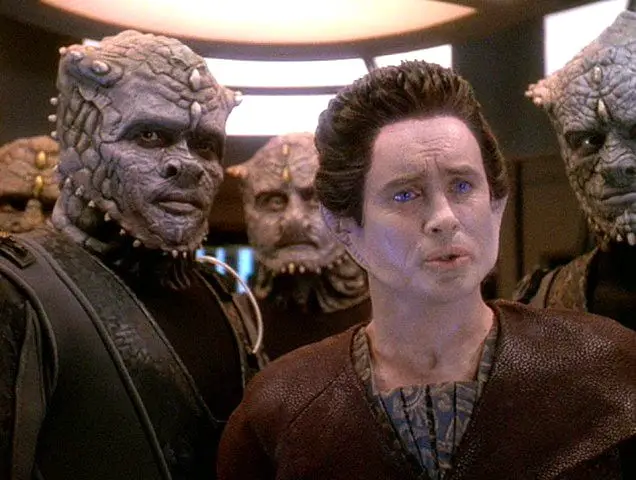
The Dominion is an evil space empire ruled by a species call “The Founders.” They’re shape shifters who can take on the appearance of anyone. In the two-parter “Homefront/Paradise Lost” some of these changelings are rumoured to have infiltrated Star Fleet and the Federation government on Earth. And the place promptly goes a little nuts with paranoia. There’s an attempted military coup. (Topical!)
Then there was “The Siege of AR-558” that dealt explicitly with what war could do to good people.
As the seasons passed, open war became inevitable. And when it finally did come, the station itself was captured. And we even had a human character trying to adjust to the idea of not living in a free society.
JAKE: Are you saying no one in the Federation has read my [news] reports?
WEYOUN: If I don’t send them, they can’t read them.
JAKE: But what about freedom of the press?
WEYOUN: Please tell me you’re not that naive.
The war hardens our characters. It became a struggle for them to stay true to their values, no matter how deeply held they were. Because shit got complicated, and ambiguous.
The best moment that showcases this is also the most divisive in the franchise’s history.
No marks for guessing where I stand on it.
In the season 6 episode “In the Pale Moonlight” Sisko, the commander of the station, our hero and protagonist, does some bad things.
SISKO: So it’s a huge victory for the good guys… perhaps the turning point of the entire war. […] I lied. I cheated. I bribed men to cover up the crimes of other men. I was an accessory to murder. But most damning of all… I think I can live with it. And if I had to do it all over again… I would. Garak was right about one thing — a guilty conscience is a small price to pay for the safety of the Alpha Quadrant. So I’ll learn to live with it. Because I can live with it.
Ande sure, Sisko is trying to convince himself as much as the audience, but he did something that Gene Roddenberry would have argued his humans weren’t even capable of, and he did good. Or at least, he ended up with an outcome that helped the good guys.
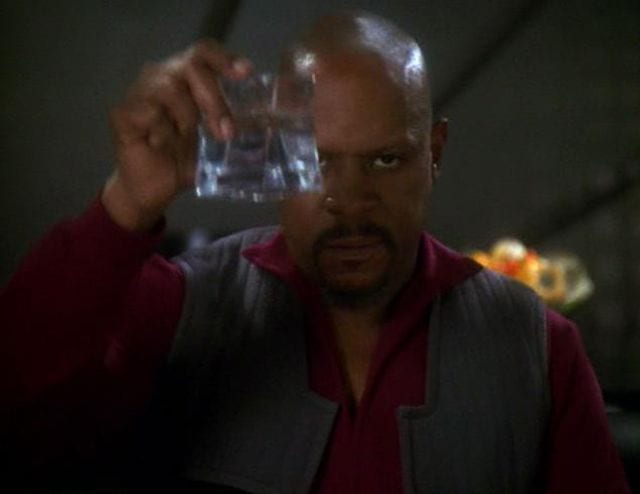
And seriously… there is so much I glossed over. The supernatural elements with the Prophets and the Emissary, the Ferengi and how they are a critique of capitalism while also providing critique of Trek’s “I Can’t Believe It’s Not Economics”, Bajoran and Cardassian politics, Dukat and Ziyal, my deep love for Miles O’Brien, Odo and his search for identity, Worf and the most interesting stuff this franchise has done with the Klingons….
It may sound like I’m scorning the other series in the franchise as hopelessly naive, or even shallow because they’re “not dark enough,” but that’s not what I’m going for at all. Deep Space 9 isn’t better because it’s “darker” (whatever that means), and it doesn’t even reject Roddenberry’s values. What it does is challenge those values and asks why they would be worth defending. All as backdrop to characters who come to us with flaws they work to overcome.
The Roddenberry Box does allow for some very good storytelling, but it can trap the characters in boxes too.
And people have never lived well in boxes.

